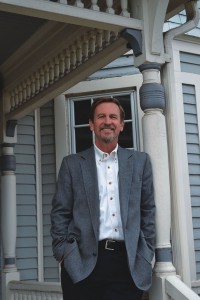Michael Hannigan is one of very few individuals to claim status as a former Colorado College student, faculty member, and administrator. (For the record, he’s also married to a CC alumna, Debra Armstrong ’79 and his brother Barry is an alumnus — Class of 1973.) “I was attracted to the fact that I would be one of the early guinea pig classes on the Block Plan,” he says of his decision to choose CC over Stanford. “I believed at that time — when you’re 17 you have no idea — but I believed it would fit with my learning style.”
Michael also had a push from Dick Wood, then the director of admission, who helped the Colorado native find financial aid, part-time jobs, and loans to make tuition doable.
He describes his student years as sometimes scary and sometimes weird. It was the era of the Vietnam War: He remembers sitting with about 200 other male students in what was then Rastall Hall watching the draft lottery picks on television. (They stopped a few numbers before his.) Protestors of President Richard Nixon’s bombing of Cambodia broke out all the windows on the ground floor of Armstrong Hall. Anti-war marchers made their way down Nevada Avenue.
And yet, it was also a time of incredible freedom. Try to pin Michael down on those details, though, and he laughs. “A lot of things that happened just aren’t for public consumption. Really. And you could probably get any CC alum in the late ’60s, early ’70s to say that very same sentiment. Yeah, there’s a lot of stuff that happened. It’s just not worth rehashing because today people would get arrested or thrown in jail or kicked out of school or fired. The consequences of behavior would be dramatically more severe today than they were 40 years ago.”
What he can talk about is his transition from student to faculty member. Pre-med at first, Michael changed direction after just one geology class. Being able to learn outdoors in the field was ideal for the person who describes himself as “ADHD to the max.” The summer after graduation, Professors Dick Beidleman and Bill Fischer hired him.
“I was their field assistant and also bus driver, and also guide, and also whatever the heck they needed me to do. It was a great job… Dick Beidleman, after the end of that summer, gave me
the nickname ‘Hannigan’s Hell On Wheels,’ because my driving skills were a little bit over the top.”
Mid-summer, the Geology Department hired Michael as a paraprofessional. About three days into that job, then-President Lloyd Worner called him to his office.
“He kept me waiting for like 30, 40, 50 minutes. And I was hot. I was sticking to the Naugahyde in his office. I had shorts on and I’d get rocking back and forth trying to unstick my sweaty legs.” Worner finally came in and told him that Professor Dick Pearl, who Michael was to assist, had had a massive stroke. “Professor Pearl is in terrible shape,” Michael remembers him saying. “And we need somebody to teach his classes.”
“And I was assuming that I was going to be fired and they would hire somebody, a visiting professor, to teach his classes.” But then Worner said, “You’re it. Tomorrow morning. Get going.” He did it for almost five years. Afterward, he started a science and environmental school in Estes Park, then taught in Denver before returning to work in CC’s Development Office. For about a decade he served a variety of roles, ending up as director of development. In 1998, he stepped away from the college to help found the Pikes Peak Community Foundation.
Which brings us to today. Just 15 years in, PPCF has about 540 funds and projects and has done approximately $150 million dollars worth of philanthropic business. The foundation operates local projects including Venetucci Farm, the Fund for the Arts, Pikes Peak Urban Gardens, and the Pikes Peak Conservation Fund. Other activities range from awarding small Ingenuity Grants for individuals to teaming with the Colorado Springs Independent for the huge annual Give! campaign. Michael says the foundation’s assets total about $60 million. And that it’s time for him to retire — from the foundation, at least.“Retirement for me is not retirement. It’s reinvention and repurposing and re-engagement. But on my own time schedule and on my own terms.”
And, perhaps, working in some capacity again with CC. The entrepreneur-at-heart is fascinated by the new Innovation Institute, and hopes to mentor students in social entrepreneurship, social innovation, and the nonprofit sector.
“I can use the experiences I’ve gained in the last 35 years and help them get launched, like people helped launch me.”
More information: www.ppcf.org
